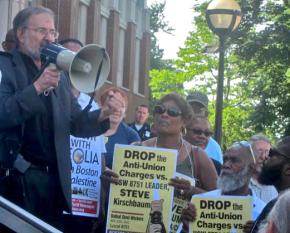Boston school bus drivers won’t back down
reports on a union struggle in Boston against attempts by city officials to roll back busing and break the school bus drivers' union.
UNION-BUSTING is back in Boston. Dozens of school bus drivers have lost their jobs and a leading union activist has been arrested on felony charges--as part of what drivers and their supporters say is a deliberate attempt to dismantle busing and intimidate union members.
In September 2013, just as the school year was starting last year, Veolia, the company contracted by the City of Boston to transport public school students, began an illegal lockout of its workers for protesting the company's union-busting practices. Veolia, the media and the city's political establishment falsely tried to depict the lockout as a wildcat strike in an effort to erode public support for the union.
The company then fired four members of the Boston School Bus Drivers Union. All four of the fired workers were leading militants in , United Steel Workers Local 8751: Vice President and Pension Administrator Steven Gillis; Recording Secretary and Charlestown Chief Steward Andre Francois; Steward and former three-term President Garry Murchison; and Grievance Chair and founding member Steve Kirschbaum.

Veolia expected it would be able to crack the union, which represents some 700 drivers, and move on--but it was wrong. In response to the firings, the union has spent the past year building a vocal, public campaign win reinstatement for the union leaders and force an end to the company's anti-union attack.
As a result, you'd be hard-pressed to find community members in Boston who are unaware of the ongoing assault on the bus drivers union. Rather than pursuing a don't-rock-the-boat approach, the union has actively sought support from other labor and community organizations and social justice movements around the city.
This past March, when Northeastern University Students for Justice in Palestine was under attack from pro-Israel forces, and again this summer, when Boston saw its largest pro-Palestine protests against Israel's slaughter in Gaza, the bus drivers union was present, drawing connections between Veolia's support for re-segregation here at home and its investments in Israel apartheid and illegal settlements in the West Bank.
Yet just when it seemed this fight could get any dirtier, it did. This June, Boston Public School officials voted to officially end busing for middle school students--a program that was fought for and won by Black communities as part of the battle to desegregate the city's public school system and end the practice of de facto educational apartheid. Dozens of bus drivers lost their jobs as a result.
Then, in early July, police filed multiple felony charges against Kirschbaum for his involvement in a large rally of union workers and supporters. Kirschbaun is accused of breaking into Veolia headquarters during the demonstration and assaulting an employee--charges that he and the union vehemently deny. In fact, the union informed the company and police in advance that members would be asserting their right to access the property to conduct union activity--a right specifically guaranteed to them under their contract.
VEOLIA'S EFFORT to dismantle the Boston School Bus Drivers Union has been backed at nearly every level of the city's political establishment, from former Mayor Thomas Menino and the newly elected mayor and supposed "labor ally" Marty Walsh, to the majority of the City Council, which has refused to participate in hearings against Veolia for its illegal practices. Walsh even went out of his way last year to condemn the union in the Boston Globe.
In several important ways, however, this struggle is about more than just the school bus drivers. The attack against the union needs to be seen in the context of a decades-long, nationwide assault by employers and the government to weaken the power of organized labor. This assault intensified in recent years when the Great Recession was used as an opportunity to drive through austerity measures in the name of "shared sacrifice." Silencing those who try to fight back has been central to the austerity agenda.
The campaign against the union is also connected to the city's larger effort to re-segregate Boston's Public School system and roll back the gains won for communities of color and working people in the wake of the civil rights movement. In the eyes of city officials, ending busing for Boston's public schools will also help to gut a union that has been unafraid to position itself as an advocate for racial justice.
The Boston School Bus Drivers Union has earned a reputation as one of the city's more militant social justice unions, with a history of fighting against school closings and budget cuts, and linking up with other causes, including the antiwar and immigrant rights movements. For city officials eager to make Boston a place for the 1 Percent, union-busting and re-segregation go hand in hand.
The fight to defend the bus drivers union, win back the jobs of the fired workers, and get the bogus charges against Steve Kirschbaum dropped isn't just a union fight--it is a fight for all of us. In a time of ramped-up gentrification, increasing budget cuts and austerity, and record-high levels of police brutality and incarceration in Boston, the city's 1 Percent are hoping they'll be able use their campaign against the Boston School Bus Drivers Union to set an example for the rest of us.
Their message is crystal clear: Don't fight back. That's precisely why we have to fight--and build solidarity with the union in Boston and beyond.


